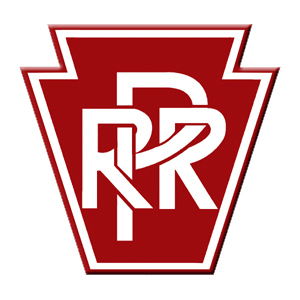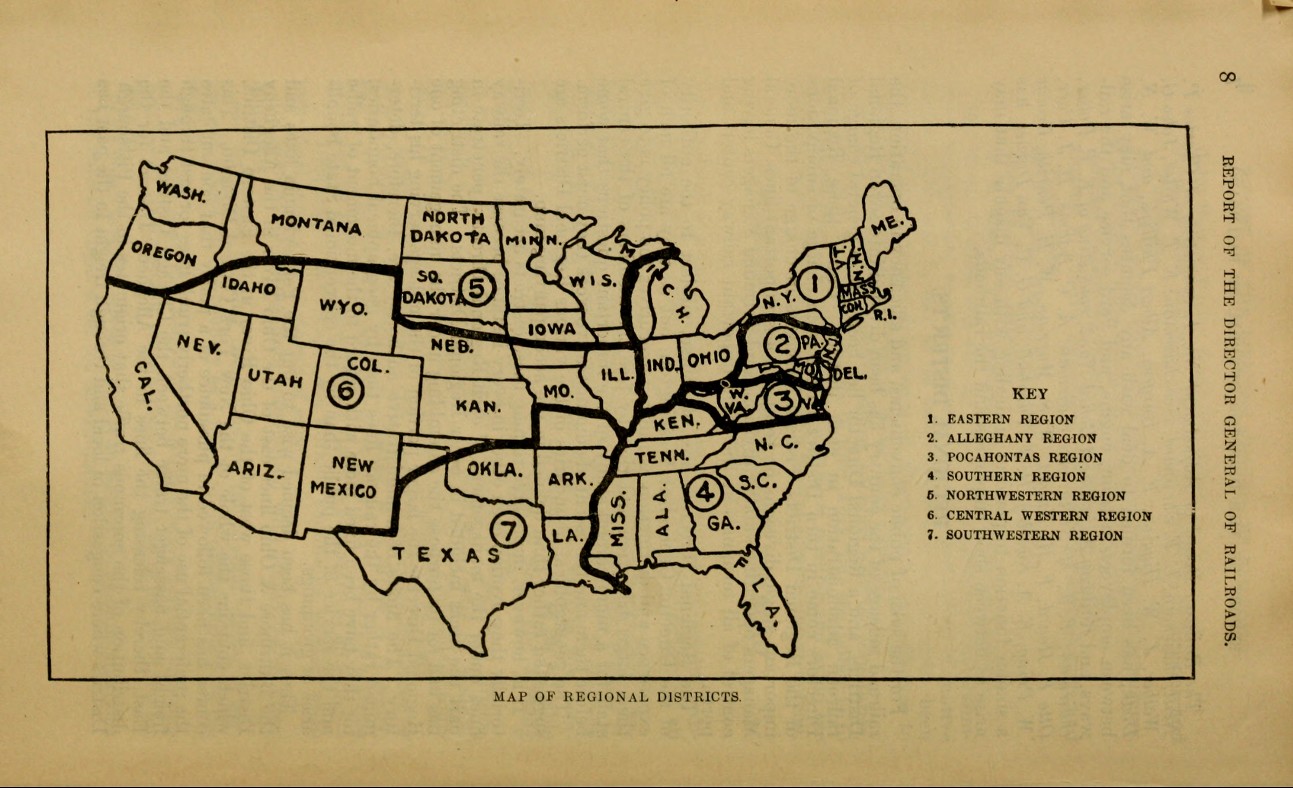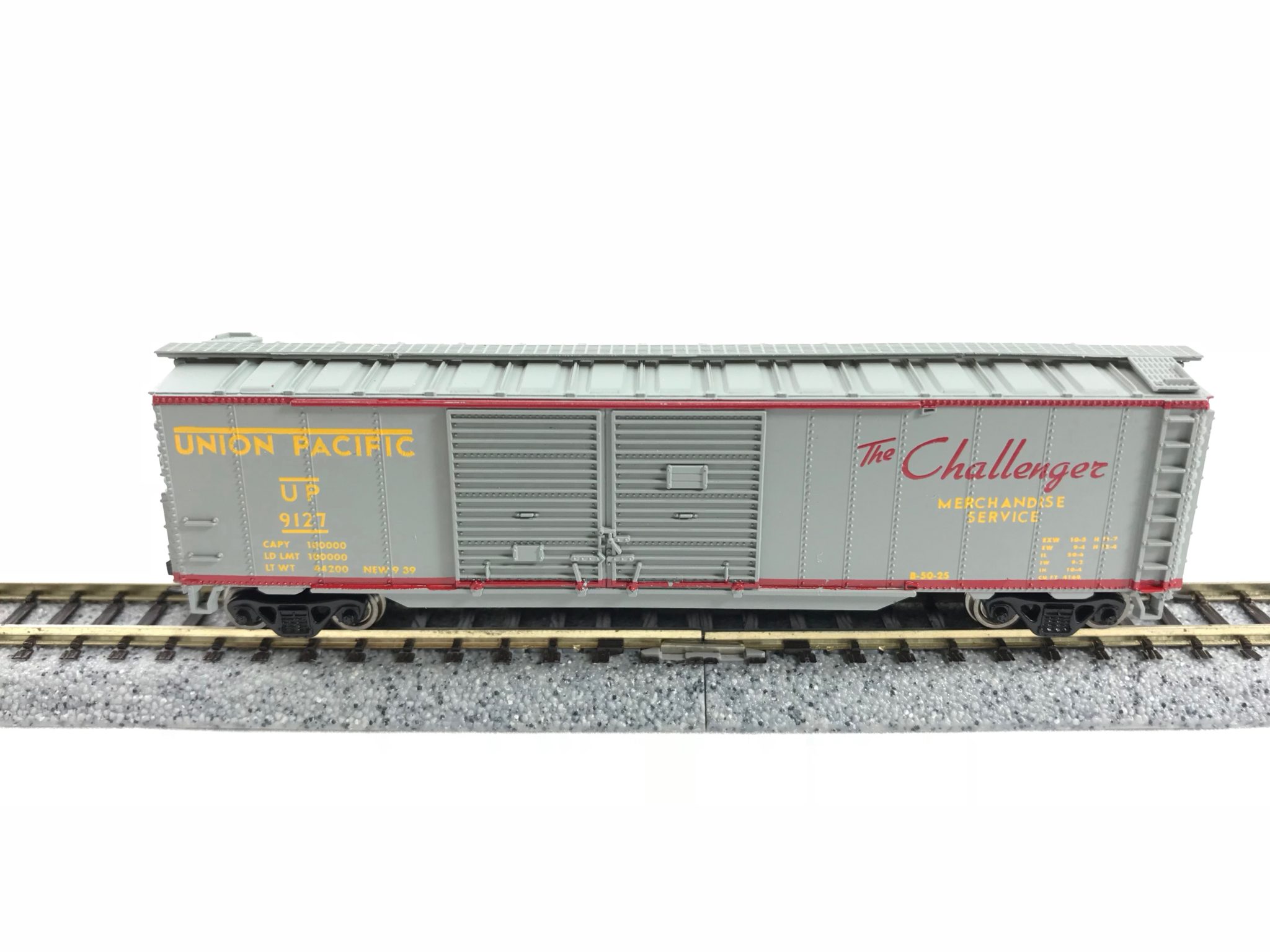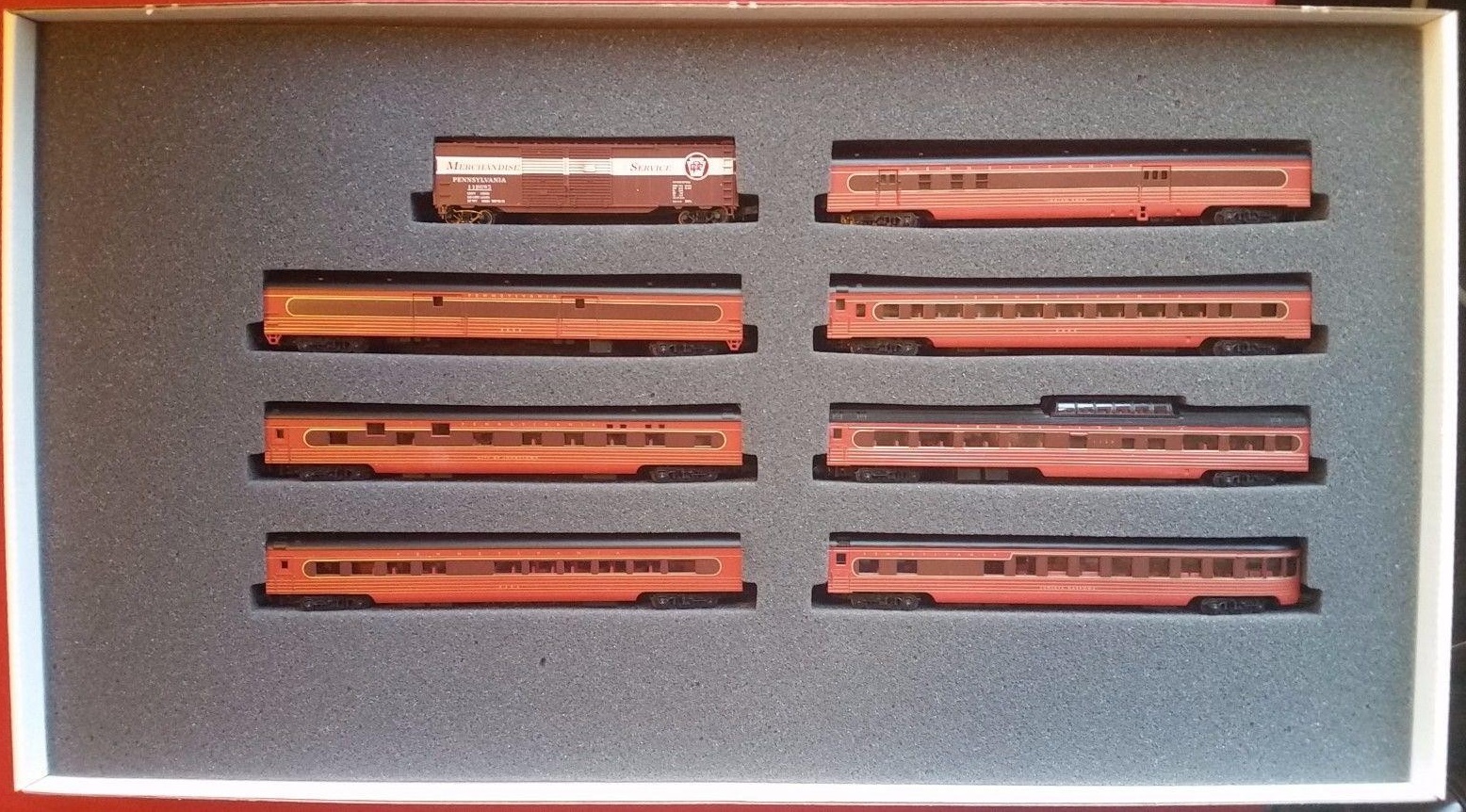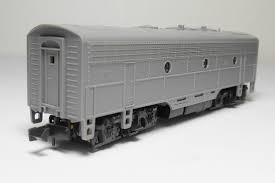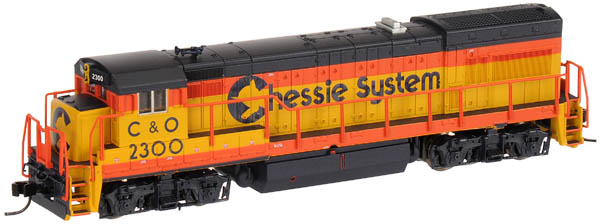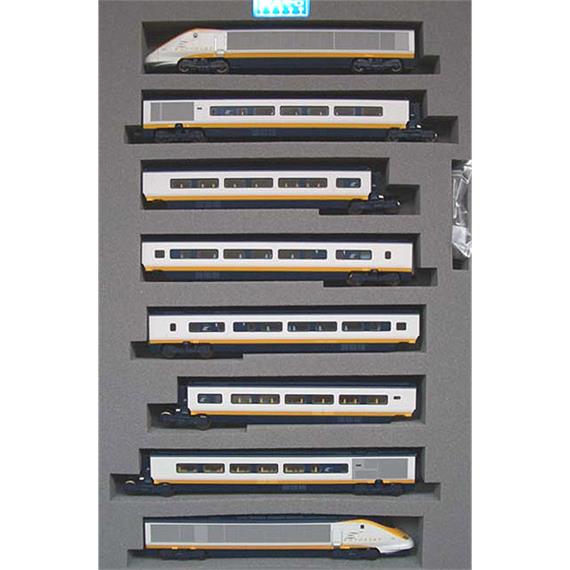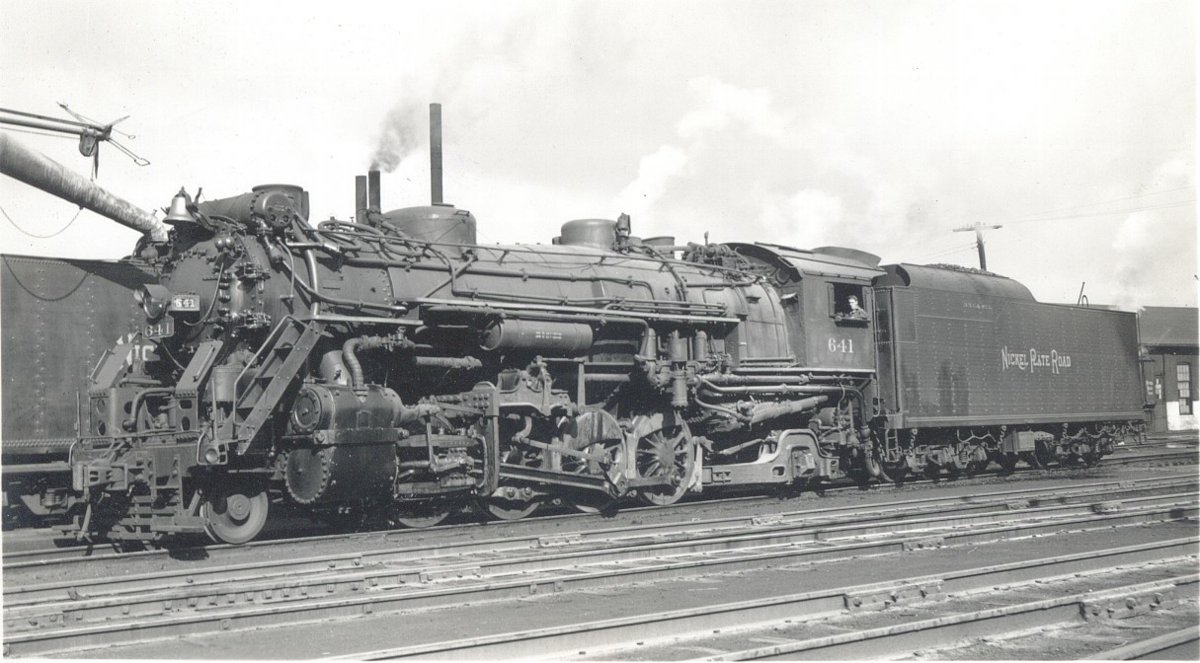Specific Item Information: USRA 2-8-2 MIKADO w/STD Tender
Model Information: Model Power introduced this model in 2002. They are manufactured in Korea and feature die-cast bodies. This makes them fairly solid. Unlike many steam engines they also are very DCC-Friendly. The fall short of being fully DCC-Ready because they do not support drop-in decoders and instead require some manipulation of wiring. They run very well and can pull a lot of cars. The shell details are excellent
Unfortunately, the design is not great for running and parts of the lower shell can get mangled when they hit rough patches of track (especially turnouts). This can effectively put one of these out of commission. For this reason we advise buying these from a certified dealer because if you have to return them for repairs you will need the documentation.>
Unfortunately, the design is not great for running and parts of the lower shell can get mangled when they hit rough patches of track (especially turnouts). This can effectively put one of these out of commission. For this reason we advise buying these from a certified dealer because if you have to return them for repairs you will need the documentation.>
DCC Information: It is pretty easy to add DCC to this engine. However, it is not DCC-Ready as you need to splice in a decoder inside the tender. Not a lot of work, but not as nice as a drop-in decoder swap.
Prototype History: The Heavy Mikado was "conceived" under the auspices of the United States Railway Administration (USRA), an agency established during WWI to regulate the railroad industry during the war.
One of the first undertakings of the USRA was to develop locomotive (and rolling stock) designs that the railroads could share.
This "common design" program was highly successful in streamlining production, and many USRA engines were used long after the war was over, essentially "outliving" the agency that conceived them.
The 2-8-2 is a railroad steam locomotive that has one leading axle followed by four powered driving axles and one trailing axle. This configuration of steam locomotive is most often referred to as a Mikado, or shortened to just "Mike". The USRA ultimately created 12 different steam locomotive designs, including both the Heavy Mikado and Light Mikado. Both the Light and Heavy Mikado used the same 63" drivers and running gear, but the Heavy Mike had a fatter boiler and put out more pounds on the drivers. This resulted in a more powerful locomotive.
Under the USRA's watch, 233 Heavy Mikados were built. Including copies built later, the total number of Heavy Mikes was 957 units, purchased originally by 23 different railroads, primarily in freight service. Some Mikado steam engine are still in service today, employed mostly for tourist or railfan trips.
The 2-8-2 is a railroad steam locomotive that has one leading axle followed by four powered driving axles and one trailing axle. This configuration of steam locomotive is most often referred to as a Mikado, or shortened to just "Mike". The USRA ultimately created 12 different steam locomotive designs, including both the Heavy Mikado and Light Mikado. Both the Light and Heavy Mikado used the same 63" drivers and running gear, but the Heavy Mike had a fatter boiler and put out more pounds on the drivers. This resulted in a more powerful locomotive.
Under the USRA's watch, 233 Heavy Mikados were built. Including copies built later, the total number of Heavy Mikes was 957 units, purchased originally by 23 different railroads, primarily in freight service. Some Mikado steam engine are still in service today, employed mostly for tourist or railfan trips.
Road Name History: The Pennsylvania Railroad (reporting mark PRR) was an American Class I railroad, founded in 1846. Commonly referred to as the "Pennsy," the PRR was headquartered in Philadelphia, Pennsylvania.
The PRR was the largest railroad by traffic and revenue in the U.S. for the first half of the twentieth century. Over the years, it acquired, merged with or owned part of at least 800 other rail lines and companies. At the end of 1925, it operated 10,515 miles of rail line; in the 1920s, it carried nearly three times the traffic as other railroads of comparable length, such as the Union Pacific or Atchison, Topeka & Santa Fe railroads. Its only formidable rival was the New York Central (NYC), which carried around three-quarters of PRR's ton-miles.
At one time, the PRR was the largest publicly traded corporation in the world, with a budget larger than that of the U.S. government and a workforce of about 250,000 people. The corporation still holds the record for the longest continuous dividend history: it paid out annual dividends to shareholders for more than 100 years in a row.
In 1968, PRR merged with rival NYC to form the Penn Central Transportation Company, which filed for bankruptcy within two years. The viable parts were transferred in 1976 to Conrail, which was itself broken up in 1999, with 58 percent of the system going to the Norfolk Southern Railway (NS), including nearly all of the former PRR. Amtrak received the electrified segment east of Harrisburg.
The PRR was the largest railroad by traffic and revenue in the U.S. for the first half of the twentieth century. Over the years, it acquired, merged with or owned part of at least 800 other rail lines and companies. At the end of 1925, it operated 10,515 miles of rail line; in the 1920s, it carried nearly three times the traffic as other railroads of comparable length, such as the Union Pacific or Atchison, Topeka & Santa Fe railroads. Its only formidable rival was the New York Central (NYC), which carried around three-quarters of PRR's ton-miles.
At one time, the PRR was the largest publicly traded corporation in the world, with a budget larger than that of the U.S. government and a workforce of about 250,000 people. The corporation still holds the record for the longest continuous dividend history: it paid out annual dividends to shareholders for more than 100 years in a row.
In 1968, PRR merged with rival NYC to form the Penn Central Transportation Company, which filed for bankruptcy within two years. The viable parts were transferred in 1976 to Conrail, which was itself broken up in 1999, with 58 percent of the system going to the Norfolk Southern Railway (NS), including nearly all of the former PRR. Amtrak received the electrified segment east of Harrisburg.
Brand/Importer Information: Founded in the late 1960's by Michael Tager, the 3rd generation business specializes in quality hobby products serving the toy and hobby markets worldwide. During its 50 years of operation, Model Power has developed a full line of model railroading products, die-cast metal aircraft, and die-cast metal cars and trucks.
In early 2014, Model Power ceased its business operations. Its extensive portfolio of intellectual property and physical assets are now exclusively produced, marketed, sold, and distributed by MRC (Model Power, MetalTrain and Mantua) and by Daron (Postage Stamp Airplanes and Airliner Collection).
In early 2014, Model Power ceased its business operations. Its extensive portfolio of intellectual property and physical assets are now exclusively produced, marketed, sold, and distributed by MRC (Model Power, MetalTrain and Mantua) and by Daron (Postage Stamp Airplanes and Airliner Collection).
Item created by: CNW400 on 2023-02-06 09:14:27
If you see errors or missing data in this entry, please feel free to log in and edit it. Anyone with a Gmail account can log in instantly.
If you see errors or missing data in this entry, please feel free to log in and edit it. Anyone with a Gmail account can log in instantly.




